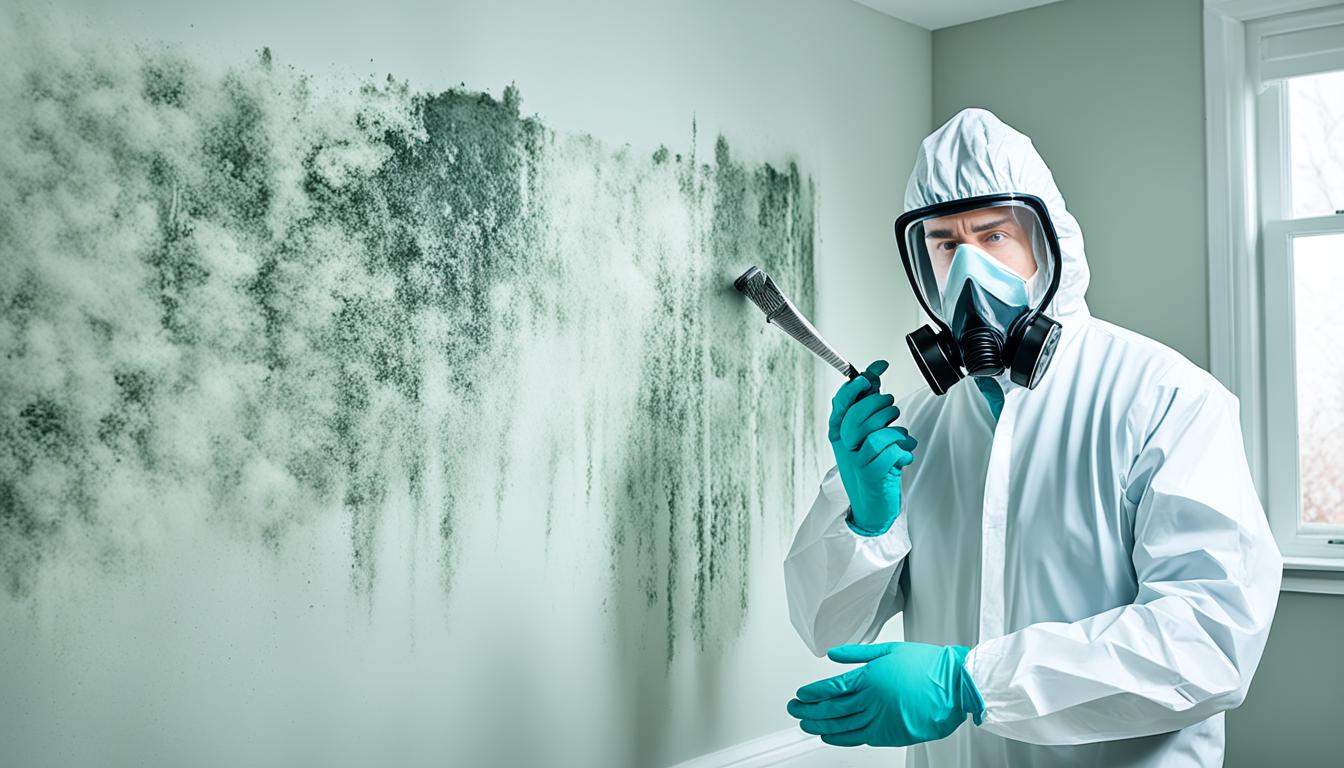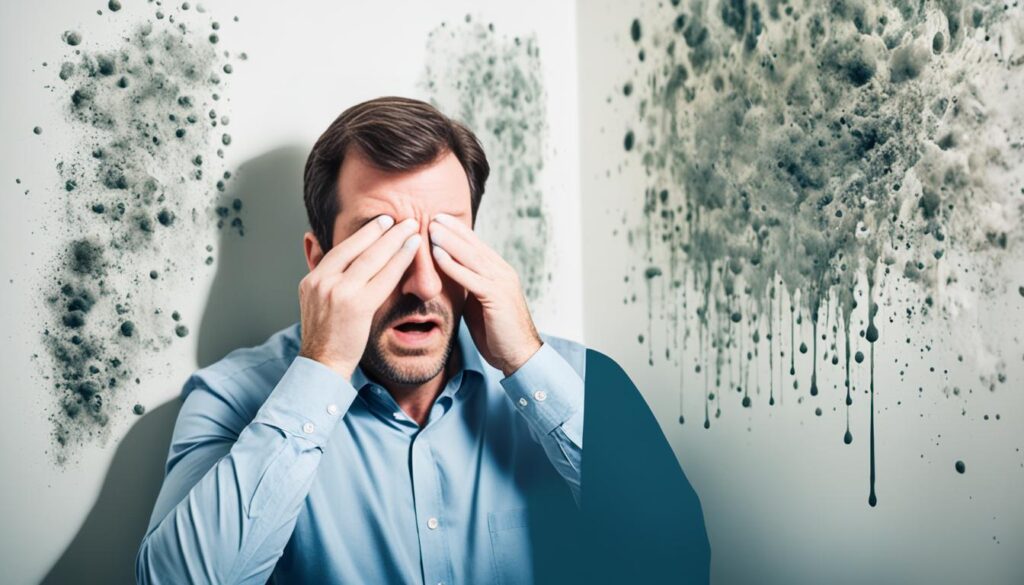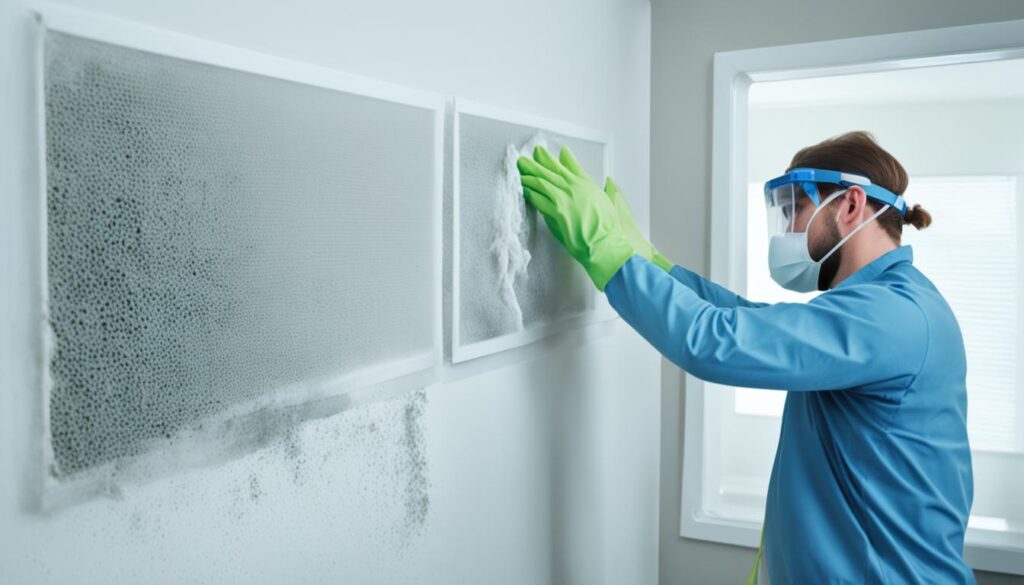
Mold Poison Risks: Symptoms and Safety Tips
Welcome to our comprehensive guide on mold poison risks, symptoms, and safety tips. Mold exposure can have adverse effects on your health, leading to various symptoms and potential long-term consequences. Understanding the risks associated with mold poison is crucial for safeguarding yourself and your loved ones.
Exposure to mold can occur in various settings, including homes, offices, and public spaces. Mold thrives in areas with high humidity levels and poor ventilation, such as bathrooms, basements, and kitchens. When mold spores are inhaled or come into contact with the skin, they can trigger a range of health issues.
In the following sections, we will explore the symptoms that may indicate mold poison and provide essential safety tips to help protect your health. By understanding these vital aspects, you can take proactive measures to minimize the risks associated with mold exposure.
Key Takeaways:
- Exposure to mold can have adverse effects on your health.
- Mold thrives in areas with high humidity and poor ventilation.
- Symptoms of mold poison can vary, from respiratory issues to skin irritations.
- Taking essential safety measures can help prevent mold poisoning.
- Regular cleaning routines and proper ventilation are crucial in minimizing mold exposure.
Remember to prioritize your well-being by staying informed and implementing these safety tips to mitigate the risks associated with mold poison.
For professional mold assessments, prevention, and remediation services in Miami, contact Fix Mold Miami at 305-465-6653.
Identifying Symptoms of Mold Poison
When it comes to mold poison, recognizing the symptoms promptly is crucial to protecting your health. Exposure to mold can cause a range of health issues, affecting different individuals in various ways. In this section, we will explore the common symptoms associated with mold poison, enabling you to stay vigilant and take appropriate action.
Respiratory Issues
Mold spores can trigger respiratory problems, such as coughing, wheezing, and shortness of breath. Individuals with underlying respiratory conditions, such as asthma or allergies, may experience exacerbated symptoms when exposed to mold. It is essential to pay attention to any noticeable changes in your breathing and seek medical advice if respiratory issues persist.
Allergic Reactions
Mold exposure can also lead to allergic reactions in susceptible individuals. Symptoms may include sneezing, nasal congestion, itchy or watery eyes, and a runny nose. These allergic reactions may mirror those caused by other allergens, making it crucial to identify the underlying cause to address the issue effectively.
Dermatological Irritations
Some individuals may develop skin problems as a result of mold exposure. These can manifest as rashes, itching, or skin inflammation. If you experience persistent skin irritations that coincide with exposure to moldy environments, it is advisable to consult a healthcare professional for a proper diagnosis and treatment.
Neurological Symptoms
In rare cases, mold exposure may lead to neurological symptoms. These can include headaches, dizziness, memory problems, difficulty concentrating, and even mood changes. If you notice any unusual neurological symptoms alongside exposure to mold, it is important to seek medical attention to rule out any potential complications.
It is worth noting that individuals may experience a combination of these symptoms or exhibit entirely different reactions to mold exposure. The severity and duration of symptoms can also vary. Hence, it is crucial to consult a healthcare professional for an accurate diagnosis and appropriate treatment.
To provide a visual reference to the various symptoms associated with mold poison, here is a table summarizing the common signs:
| Common Symptoms of Mold Poison |
|---|
| Respiratory Issues |
| Allergic Reactions |
| Dermatological Irritations |
| Neurological Symptoms |

By remaining vigilant and paying attention to these symptoms, you can take appropriate actions to protect yourself from the potential dangers of mold poison. In the next section, we will provide essential safety measures and tips to prevent mold poisoning.
Essential Safety Measures to Prevent Mold Poisoning
Protecting yourself and your loved ones from mold poisoning requires implementing effective safety measures. By following these practical tips, you can reduce the risk of mold exposure and safeguard your health.
1. Maintain Proper Ventilation
Adequate ventilation is crucial in preventing mold growth. Ensure that your home is well-ventilated by opening windows, using exhaust fans, and allowing fresh air to circulate throughout the rooms. Proper airflow helps to minimize moisture buildup and inhibits the growth of mold.
2. Control Moisture Levels
Mold thrives in humid and damp environments. To prevent mold growth, it is essential to control moisture levels in your home:
- Keep humidity levels below 50% by using dehumidifiers, especially in basements and bathrooms.
- Fix any water leaks promptly and address areas prone to moisture buildup, such as pipes, roofs, and windows.
- Regularly inspect and clean your gutters to ensure proper drainage.
3. Regularly Inspect and Clean
Perform routine inspections of your home to identify any areas where mold may be present. Regularly clean these areas using appropriate cleaning solutions. Here are some areas to pay extra attention to:
- Bathrooms: Clean and dry bathroom surfaces regularly, paying close attention to shower curtains, tiles, and grout lines.
- Kitchen: Keep the kitchen clean and dry, wiping away any spills or moisture promptly.
- Basements and attics: These areas are prone to mold growth due to high humidity levels. Regularly inspect and clean them to prevent mold accumulation.
4. Use Mold-Resistant Products
When renovating or constructing your home, choose materials and products that are resistant to mold. Opt for mold-resistant drywall, paints, and insulation to minimize the risk of mold growth.
5. Have Regular HVAC Maintenance
Your HVAC system plays a crucial role in maintaining a healthy indoor environment. Schedule regular maintenance and inspections to ensure proper functioning and cleanliness. Clean or replace air filters regularly to prevent mold spores from circulating in your home.
6. Properly Dry Wet Areas
In the event of a water spill or flood, it is crucial to dry the affected areas promptly. Use fans and dehumidifiers to accelerate the drying process and prevent mold growth. Remove wet carpets or any porous materials that cannot be effectively dried.
7. Seek Professional Help
If you suspect or identify significant mold issues in your home, it is advisable to seek professional help. Mold remediation specialists can assess the extent of the problem, safely remove mold, and take preventive measures to minimize future mold growth.
By implementing these essential safety measures, you can significantly reduce the risk of mold poisoning and create a healthier living environment for you and your family.

| Safety Measures | Benefits |
|---|---|
| Proper Ventilation | Minimizes moisture buildup and inhibits mold growth. |
| Controlling Moisture Levels | Prevents the ideal conditions for mold growth by keeping humidity levels low and addressing water leaks. |
| Regular Inspection and Cleaning | Identifies and eliminates mold-prone areas, reducing the risk of mold exposure. |
| Using Mold-Resistant Products | Reduces the likelihood of mold growth in construction and renovation projects. |
| Regular HVAC Maintenance | Maintains a clean and mold-free indoor environment. |
| Properly Drying Wet Areas | Prevents mold growth following water spills or flooding incidents. |
| Seeking Professional Help | Ensures effective mold remediation and prevents further mold-related issues. |
Conclusion
In conclusion, being aware of the risks associated with mold poison is essential for maintaining a healthy living environment. Mold exposure can lead to a variety of symptoms ranging from respiratory issues to skin irritations, indicating the need for immediate attention.
To minimize these potential dangers, it is crucial to implement the recommended safety measures. This includes ensuring proper ventilation, controlling moisture levels, and regularly cleaning and inspecting your home for any signs of mold growth.
For professional mold assessments, prevention, and remediation services in Miami, you can rely on Fix Mold Miami. Their team of experts is equipped with the knowledge and tools to handle mold-related issues efficiently. To schedule an appointment or request more information, contact Fix Mold Miami at 305-465-6653.




